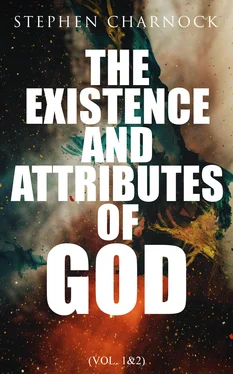Stephen Charnock - The Existence and Attributes of God (Vol. 1&2)
Здесь есть возможность читать онлайн «Stephen Charnock - The Existence and Attributes of God (Vol. 1&2)» — ознакомительный отрывок электронной книги совершенно бесплатно, а после прочтения отрывка купить полную версию. В некоторых случаях можно слушать аудио, скачать через торрент в формате fb2 и присутствует краткое содержание. Жанр: unrecognised, на английском языке. Описание произведения, (предисловие) а так же отзывы посетителей доступны на портале библиотеки ЛибКат.
- Название:The Existence and Attributes of God (Vol. 1&2)
- Автор:
- Жанр:
- Год:неизвестен
- ISBN:нет данных
- Рейтинг книги:3 / 5. Голосов: 1
-
Избранное:Добавить в избранное
- Отзывы:
-
Ваша оценка:
- 60
- 1
- 2
- 3
- 4
- 5
The Existence and Attributes of God (Vol. 1&2): краткое содержание, описание и аннотация
Предлагаем к чтению аннотацию, описание, краткое содержание или предисловие (зависит от того, что написал сам автор книги «The Existence and Attributes of God (Vol. 1&2)»). Если вы не нашли необходимую информацию о книге — напишите в комментариях, мы постараемся отыскать её.
The Existence and Attributes of God (Vol. 1&2) — читать онлайн ознакомительный отрывок
Ниже представлен текст книги, разбитый по страницам. Система сохранения места последней прочитанной страницы, позволяет с удобством читать онлайн бесплатно книгу «The Existence and Attributes of God (Vol. 1&2)», без необходимости каждый раз заново искать на чём Вы остановились. Поставьте закладку, и сможете в любой момент перейти на страницу, на которой закончили чтение.
Интервал:
Закладка:
4. In making use of the name of God to countenance our sin. When we set up an opinion that is a friend to our lusts, and then dig deep into the Scripture to find crutches to support it, and authorize our practices; when men will thank God for what they have got by unlawful means, fathering the fruit of their cheating craft, and the simplicity of their chapmen upon God; crediting their cozenage by his name, as men do brass money, with a thin plate of silver, and the stamp and image of the prince. The Jews urge the law of God for the crucifying his Son (John xix. 7): “We have a law, and by that law he is to die,” and would make him a party in their private revenge. Thus often when we have faltered in some actions, we wipe our mouths, as if we sought God more than our own interest, prostituting the sacred name and honor of God, either to hatch or defend some unworthy lust against his word. 275Is not all this a high degree of atheism?
1. It is a vilifying God, an abuse of the highest good. Other sins subject the creature and outward things to them, but acting in religious services for self, subjects not only the highest concernments of men’s souls, but the Creator himself to the creature, nay, to make God contribute to that which is the pleasure of the devil, a greater slight than to cast the gifts of a prince to a herd of nasty swine. It were more excusable to serve ourselves of God upon the higher accounts, such that materially conduce to his glory; but it is an intolerable wrong to make him and his ordinances caterers for our own bellies, as they did: 276they sacrificed the נדבות of which the offerer might eat, not out of any reference to God, but love to their gluttony; not to please him, but feast themselves. The belly was truly made the god, when God was served only in order to the belly; as though the blessed God had his being, and his ordinances were enjoined to pleasure their foolish and wanton appetites; as though the work of God were only to patronize unrighteous ends, and be as bad as themselves, and become a pander to their corrupt affections.
2. Because it is a vilifying of God, it is an undeifying or dethroning God. It is an acting as if we were the lords, and God our vassal; a setting up those secular ends in the place of God, who ought to be our ultimate end in every action; to whom a glory is as due, as his mercy to us is utterly unmerited by us. He that thinks to cheat and put the fool upon God by his pretences, doth not heartily believe there is such a being. He could not have the notion of a God, without that of omniscience and justice; an eye to see the cheat, and an arm to punish it. The notion of the one would direct him in the manner of his services, and the sense of the other would scare him from the cherishing his unworthy ends. He that serves God with a sole respect to himself, is prepared for any idolatry; his religion shall warp with the times and his interest; he shall deny the true God for an idol, when his worldly interest shall advise him to it, and pay the same reverence to the basest image, which he pretends now to pay to God; as the Israelites were as real for idolatry under their basest princes, as they were pretenders to the true religion under those that were pious. Before I come to the use of this, give me leave to evince this practical atheism by two other considerations.
1. Unworthy imaginations of God. “The fool hath said in his heart, There is no God:” that is, he is not such a God as you report him to be; this is meant by their being “corrupt,” in the second verse, corrupt being taken for playing the idolaters (Exod. xxxii. 7). We cannot comprehend God; if we could, we should cease to be finite; and because we cannot comprehend him, we erect strange images of him in our fancies and affections. And since guilt came upon us, because we cannot root out the notions of God, we would debase the majesty and nature of God, that we may have some ease in our consciences, and lie down with some comfort in the sparks of our own kindling. This is universal in men by nature. “God is not in all his thoughts;” 277not in any of his thoughts, according the excellency of his nature and greatness of his majesty. As the heathen did not glorify God as God, so neither do they conceive of God as God; they are all infected with some one or other ill opinion of him, thinking him not so holy, powerful, just, good, as he is, and as the natural force of the human understanding might arrive to. We join a new notion of God in our vain fancies, and represent him not as he is, but as we would have him to be, fit for our own use, and suited to our own pleasure. We set that active power of imagination on work, and there comes out a god (a calf) whom we own for a notion of God. Adam cast him into so narrow a mould, as to think that himself, who had newly sprouted up by his almighty power, was fit to be his corrival in knowledge, and had vain hopes to grasp as much as infiniteness; if he, in his first declining, begun to have such a conceit, it is no doubt but we have as bad under a mass of corruption. When holy Agur speaks of God, he cries out that he had not “the understanding of a man, nor the knowledge of the holy;” 278he did not think rationally of God, as man might by his strength at his first creation. There are as many carved images of God as there are minds of men, and as monstrous shapes as those corruptions into which they would transform him. Hence sprang,
1. Idolatry. Vain imaginations first set afloat and kept up this in the world. Vain imaginations of the God “whose glory they changed into the image of corruptible man.” 279They had set up vain images of him in their fancy, before they set up idolatrous representations of him in their temples; the likening him to those idols of wood and stone, and various metals, were the fruit of an idea erected in their own minds. This is a mighty debasing the Divine nature, and rendering him no better than that base and stupid matter they make the visible object of their adoration; equalling him with those base creatures they think worthy to be the representations of him. Yet how far did this crime spread itself in all corners of the world, not only among the more barbarous and ignorant, but the more polished and civilized nations! Judea only, where God had placed the ark of his presence, being free from it, in some intervals of time only after some sweeping judgment. And though they vomited up their idols under some sharp scourge, they licked them up again after the heavens were cleared over their heads: the whole book of Judges makes mention of it. And though an evangelical light hath chased that idolatry away from a great part of the world, yet the principle remaining coins more spiritual idols in the heart, which are brought before God in acts of worship.
2. Hence all superstition received its rise and growth. When we mint a god according to our own complexion, like to us in mutable and various passions, soon angry and soon appeased, it is no wonder that we invent ways of pleasing him after we have offended him, and think to expiate the sin of our souls by some melancholy devotions and self‑chastisements. Superstition is nothing else but an unscriptural and unrevealed dread of God. 280When they imagined him a rigorous and severe master, they cast about for ways to mitigate him whom they thought so hard to be pleased: a very mean thought of him, as if a slight and pompous devotion could as easily bribe and flatter him out of his rigors, as a few good words or baubling rattles could please and quiet little children; and whatsoever pleased us, could please a God infinitely above us. Such narrow conceits had the Philistines, when they thought to still the anger of the God of Israel, whom they thought they possessed in the ark, with the present of a few golden mice. 281All the superstition this day living in the world is built upon this foundation: so natural it is to man to pull God down to his own imaginations, rather than raise his imaginations up to God. Hence doth arise also the diffidence of his mercy, though they repent; measuring God by the contracted models of their own spirits; as though his nature were as difficult to pardon their offences against him, as they are to remit wrongs done to themselves.
Читать дальшеИнтервал:
Закладка:
Похожие книги на «The Existence and Attributes of God (Vol. 1&2)»
Представляем Вашему вниманию похожие книги на «The Existence and Attributes of God (Vol. 1&2)» списком для выбора. Мы отобрали схожую по названию и смыслу литературу в надежде предоставить читателям больше вариантов отыскать новые, интересные, ещё непрочитанные произведения.
Обсуждение, отзывы о книге «The Existence and Attributes of God (Vol. 1&2)» и просто собственные мнения читателей. Оставьте ваши комментарии, напишите, что Вы думаете о произведении, его смысле или главных героях. Укажите что конкретно понравилось, а что нет, и почему Вы так считаете.












